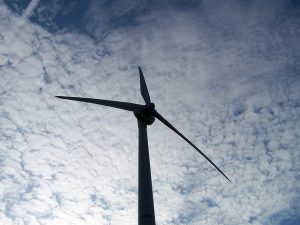Nofar Energy in Israel expands its collaboration with Tesla: the company had entered a second commercial agreement with Tesla to buy battery-stored power systems from Tesla with a total capacity of 200 megawatts for $54 million USD. Tesla is in the business of electric cars. We already see them whizzing around on the streets of Montreal and Tel Aviv.
Tesla also builds charging stations for personal use, as well as industrial battery storage solutions.
Battery storage is critical to the global electric grid and is an increasingly important as we transition to sustainable energy. Without storage, energy not used will be lost. To match global demand for massive battery storage projects like Hornsdale, Tesla designed and engineered a new battery product specifically for utility-scale projects and they call it Megapack.

Tesla’s megapack battery storage
Megapack significantly reduces the complexity of large-scale battery storage and provides an easy installation and connection process. Each Megapack comes from the factory fully-assembled with up to 3 megawatt hours (MWhs) of storage and 1.5 MW of inverter capacity, building on Powerpack’s engineering with an AC interface and 60% increase in energy density to achieve significant cost and time savings compared to other battery systems and traditional fossil fuel power plants.
Using Megapack, Tesla can deploy an emissions-free 250 MW, 1 GWh power plant in less than three months on a three-acre footprint – four times faster than a traditional fossil fuel power plant of that size. Megapack can also be DC-connected directly to solar, creating seamless renewable energy plants.
For a utility-size installations like the upcoming Moss Landing project in California with PG&E, Tesla’s Megapack will act as a sustainable alternative to natural gas “peaker” power plants. Peaker power plants fire up whenever the local utility grid can’t provide enough power to meet peak demand. They cost millions of dollars per day to operate and are some of the least efficient and dirtiest plants on the grid. Instead, a Megapack installation can use stored excess solar or wind energy to support the grid’s peak loads. Texas learned last winter that it can’t cope with blackouts.
The Tesla solution was the right fit for Nofar and who doesn’t want their brand associated with Tesla these days. But it’s a commercial agreement after all.
Under the agreement, Nofar will pay 5% and the balance according to predefined milestones. The storage systems will be supplied from January 2023 through March 2024.
Nofar builds solar power plants and electricity storage systems. Renewable energy such as solar power has no value to the grid if it can’t be stored. American consumers are finding out that their new solar power investments can’t generate income because the grid can’t handle the power the systems generate. Also electric cars don’t have much value if they are being run on power produced by fossil fuels. Nofar connects the dots as more people demand clean energy.
Nofar CEO Nadav Tenne says, “Having projected the upcoming shortage of the power grid in extended areas over a year ago, we prepared accordingly with professional capabilities and control systems, pilots, and strategic collaboration agreements with equipment makers and suppliers.

Nadav Tene, Nofar Energy
“As a result, we can leverage the partnerships we put in place to build and connect tens of storage facilities with significant capacity over the next 12 months. These facilities will generate revenues from power sales, enabling the construction and connection of tens of additional solar systems at high rates independently of the grid’s resources.
“We plan to initiate similar storage facilities through the growth platforms we own in Europe and the USA. We are proud to be the leaders of Israel’s power storage revolution.”
This is the second commercial agreement between Nofar and Tesla, with the total capacity of the storage systems to be built as part of the collaboration to 300 MW/h.
Most of the storage systems covered by the first agreement entered in February 2021 for 100 MW/h are under or nearing construction. Given the fast implementation pace of the first agreement and the considerable demand, Nofar Energy decided to expand the Tesla collaboration with an additional contract for a larger capacity.
Nofar estimates its EPC (Engineering, Procurement, and Construction) revenues from the second agreement will total about $80 million USD. The annual revenues from power sales are expected to total 7 to 15 USD million.
The Tesla storage systems will enable NOfar to build additional solar systems at higher rates in areas characterized by overloaded grids, which could not be achieved in the absence of the storage systems. Nofar Energy plans to develop and manage the storage systems for existing and new partnerships the company and its partners own, including kibbutzim, real estate, commercial, and industrial companies.
Several weeks ago, Nofar completed the construction and connection of Tesla’s first storage facility in Israel, in Kibbutz Shoval.
Offering a capacity of 2.718 MW/h, the new facility allows overcoming the constraints placed by the local power grid through connecting additional photo-voltaic systems with significant capacity at a high rate of NIS 0.45 per each Kw/h produced.
The storage system offers additional economic value due to the planned raising of electricity prices, despite the government promise that energy rates would go down if Israel started drilling for natural gas in the Mediterranean. So much for promises.




